In this exclusive interview, we have the pleasure of speaking with Laura Elizabeth, the talented entrepreneur and founder of ClientPortal. Laura shares her insights on productivity habits, revenue streams, and her experiences with profit, growth and the motivation behind her entrepreneurial journey. She also talks about the importance of onboarding in freelancing, and her experience at WordCamp Europe.
Join us as we delve into Laura’s perspective on living in the present, her insights on onboarding processes, and her impressions of WordCamp.
Here’s the video of the interview with Laura Elizabeth.
About Guest
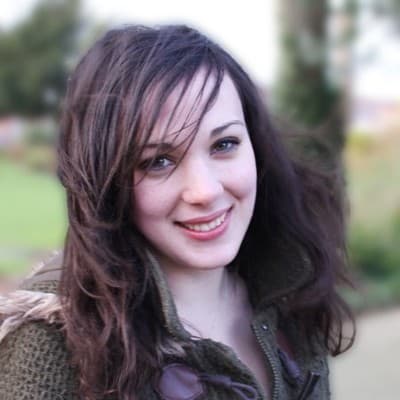
Guest Name: Laura Elizabeth
What They Do: Laura Elizabeth is the founder of ClientPortal
Company: ClientPortal
Known For: Laura Elizabeth is the founder of Client Portal—an efficient tool for project organization that is user-friendly for clients. She operates Design Academy, a platform designed to assist developers in overcoming their design apprehensions.
Social Media:
Audio Podcast with Laura Elizabeth
Video Interview with Laura Elizabeth
Video interview is in English language with English Subtitles.
Audio Podcast With Laura Elizabeth
Interview with Laura Elizabeth
Can you please give us a quick brief about who you are and what you do?
Laura: I’m Laura, the founder of ClientPortal, a WordPress plugin I developed in 2016 while freelancing as a web designer. I needed a visually appealing yet user-friendly portal to store and share deliverables with clients, but existing solutions were either too complex or costly. Faced with this gap, I decided to create my own.
Surprisingly, when I mentioned the idea at conferences and among fellow freelancers, many expressed interest in such a product. Encouraged by their response, I transformed ClientPortal, the go-to platform for freelancers, into a WordPress plugin with the help of a developer.
I dedicated myself fully to ClientPortal in 2017, leaving freelancing behind. It has remained my primary focus ever since.
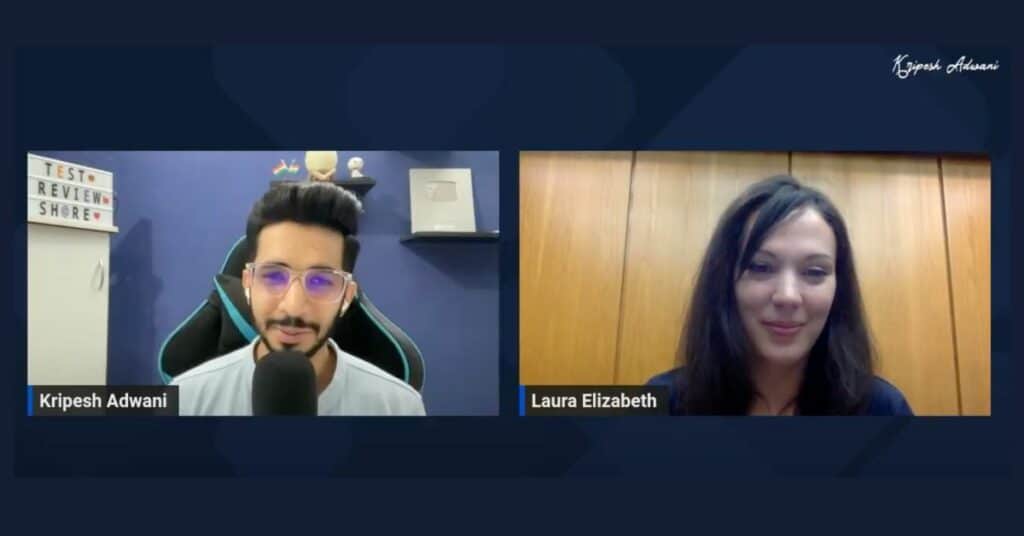
Laura can you share when you started your freelancing journey?
Laura: I started working for a design agency about 12 years ago when I was straight out of university. I worked there for about a year. After that, I decided to venture into freelancing, which lasted for about 10 years. It was an exciting and challenging period for me.
Can you tell us about your first freelance project and how you managed to secure it?
Laura: My first-ever freelance project takes me back to the early days of online freelancing platforms. It was on a platform called eLance, which later transformed into Upwork. I believe it was around 2012, but please don’t quote me on that, as I’m not the best with dates.
Back then, it was quite difficult to land your first project as a freelancer because clients preferred working with individuals who had prior experience. So, I applied to numerous postings and finally secured a job that involved recreating illustrations. It essentially involved tracing them, which seemed relatively easy, but the pay wasn’t much.
I poured a lot of effort into the project, going above and beyond expectations. When the client saw the dedication I put into it, they ended up paying me extra as a token of appreciation. It was a great review for my work, and that helped me land more projects on eLance. Over time, my freelance work expanded, and I eventually moved away from eLance and started my own independent journey.
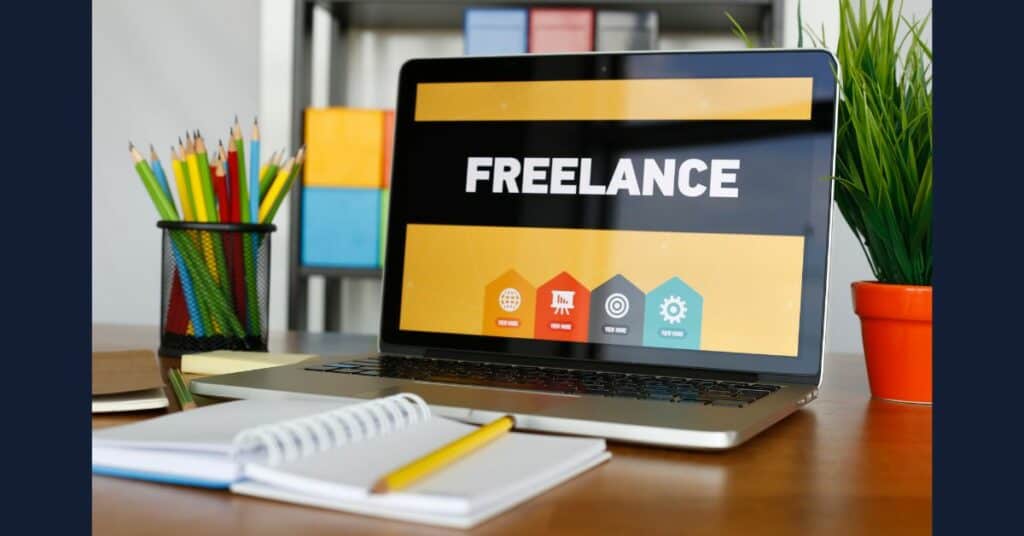
Could you share about the turning point in your freelancing career, when you started generating recurring revenue?
Laura: Prior to experiencing recurring revenue, I relied solely on project-based work. While I always managed to find new projects, there was a constant underlying worry about the consistency of incoming work. I had a mortgage to pay and concerns about whether I would be able to sustain my freelance career. It felt somewhat out of control.
However, things changed when I began offering retainers to clients. With retainers, clients paid a monthly fee and received a set number of days when I would focus on their tasks. For example, they might have received two half-days a week for specific design needs like ad banners. These retainers provided me with a baseline of recurring revenue.
Having that stability in place allowed me to focus more on pursuing larger projects that I wanted to work on. Interestingly, having this stability also had a positive impact on winning more projects. I found that I was less worried about winning projects because I didn’t depend on them as much.
This shift in mindset seemed to resonate with clients and helped me secure more projects. It was a turning point that brought a sense of stability and growth to my freelancing career.
Can you share some key moments that contributed to ClientPortal success?
Laura: The launch of ClientPortal had a promising start thanks to a partnership with a conference where I was speaking. They promoted ClientPortal to their audience, giving it a boost. But when I didn’t have the conference audience anymore, it made me realize the importance of establishing my own platform.
To do that, I began actively participating in podcast interviews like this one. I would discuss topics related to freelancing, which aligned with my expertise and interests. At the end of each interview, I would mention my free email course on freelancing and encourage listeners to sign up. Through the email course, I introduced them to ClientPortal. This approach helped generate traction and momentum for ClientPortal.
But the most significant turning point, and one that I can attribute partly to luck, was the name I chose for the product—ClientPortal. Admittedly, I’m not great at coming up with names, but it turned out to be a stroke of luck. Many people were searching for a client portal solution specifically for WordPress.
When I ranked number one on Google for “client portal WordPress,” organic traffic flooded in. This organic traffic became a major source of leads and sales for ClientPortal. It was a fortunate coincidence that had a tremendous impact on its success.
“This organic traffic became a major source of leads and sales for ClientPortal.”
Laura Elizabeth
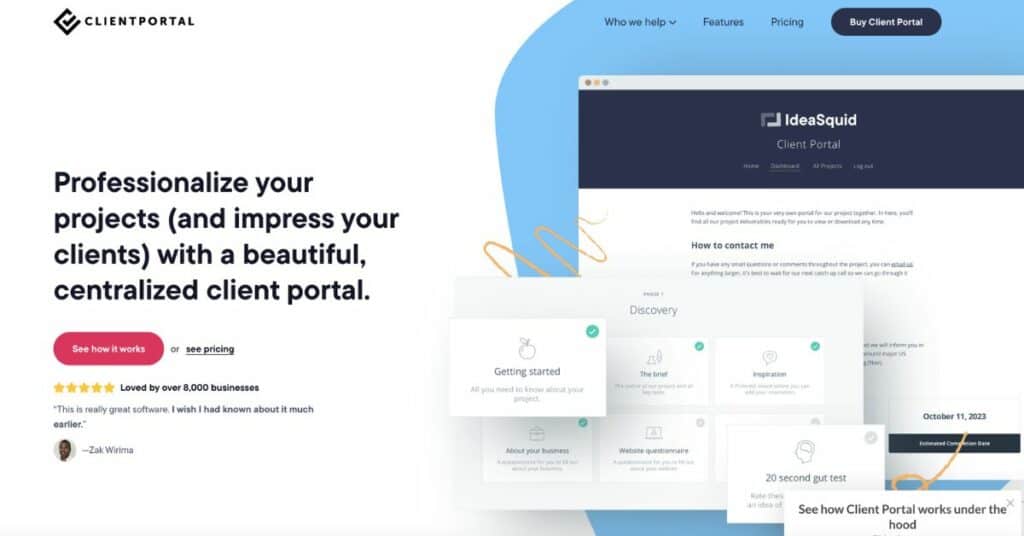
When did you start getting rankings from Google?
It took about 3 years or so. It was around 2019 or maybe 2020 when I noticed a real shift in my business. It did require patience during those three years of hard work. But I was still doing a lot of speaking, podcasts, conferences, guest posts, etc to get people to notice ClientPortal. Back then, I had to actively promote the product and engage in different marketing activities.
When Google traffic started coming in, I didn’t have to do anything and focus on improving the product. While I’m not an SEO expert myself, people have told me that providing useful content and earning backlinks, such as through podcasts and guest posts, are among the most effective strategies. Building a strong reputation and offering valuable resources have been key factors in the success of ClientPortal.
“Building a strong reputation and offering valuable resources have been key factors in the success of ClientPortal.”
Laura Elizabeth
Laura, what were the challenges that you faced while developing ClientPortal and growing your freelancing career? Could you elaborate on those challenges and how you managed to overcome them?
Laura: Absolutely. The first major challenge was building a WordPress plugin without having any coding experience. As a non-developer, it seemed impossible to create a plugin myself. Hiring a developer was an option, but I was unsure about the costs involved, both upfront and for ongoing support and maintenance. It was a financial hurdle for me.
The second challenge was juggling my freelance work while working on and growing ClientPortal. I needed to find a way to allocate time and resources to both endeavors effectively. To tackle these challenges, I found creative solutions.
How did you overcome the challenge of building a WordPress plugin without coding experience and financial constraints?
Laura: I approached this challenge by launching pre-orders for ClientPortal, similar to a Kickstarter campaign. I had an existing network and audience from a conference I had spoken at, and they were willing to promote the product through their email list. I offered the product as it was, which was essentially an HTML file. I explained to potential customers that their pre-orders would fund the development of the plugin.
If I didn’t reach a certain funding threshold, I would have had to refund everyone, which would have been my worst nightmare. However, I took the risk, and fortunately, the pre-orders exceeded my expectations. I managed to raise around $10,000, which allowed me to hire the developer I wanted.
How did you determine the amount you needed to raise for the development of the plugin?
Laura: Since I already had an MVP (Minimum Viable Product) in the form of the HTML and CSS file, I was able to gather quotes from different developers. By doing so, I had a good estimate of the costs involved. I calculated that I needed approximately $2,000 to cover the expenses of developing the plugin.
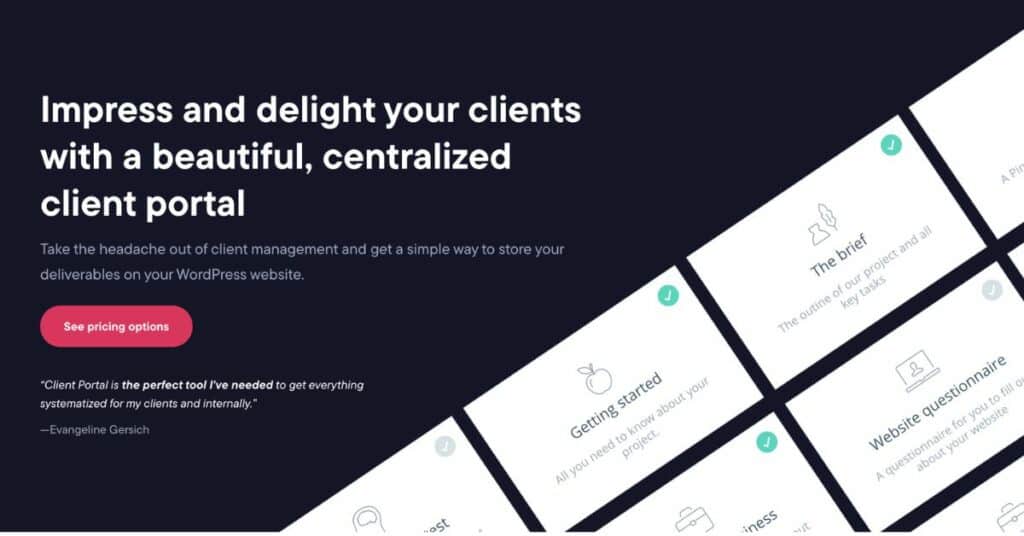
Could you tell us more about your decision to hire the specific developer?
Laura: Interestingly, the developer I hired had been following my work for a while and had a good understanding of what ClientPortal was about. When she provided me with a quote, she went beyond just giving a price. She engaged with me and shared some valuable ideas that could enhance the plugin’s functionality and user experience.
Despite being slightly more expensive, my intuition told me that she was the right person for the job. I made the decision to hire her, and she has been a fantastic addition to the team. It’s worth mentioning that she is based in Taiwan, showcasing how remote collaboration can bring talented individuals together from different parts of the world.
Laura, we’d love to know more about how you found your developers. Could you share your experience with us?
Laura: Absolutely. When it came to finding developers, I explored different avenues, and one of them was Upwork. As a freelancer myself, I was already engaged in various freelance communities, attending events, and providing training to fellow freelancers. So, I utilized those networks and communities to seek out potential developers.
I remember there was a channel in one of these communities specifically for job postings. I posted my requirements there, and because I was already active in that community and had a good rapport with its members, I felt confident that hiring someone from within that community would align well with my mindset and values.
If you don’t have an existing network or community to tap into, another option that I would consider today, although I’m not sure if it was available back then, is platforms like Codable WordPress. These platforms vet WordPress developers for you, making it easier to find the right fit for your project.
As your product, ClientPortal, started gaining traction, how has your team size evolved?
Laura: Currently, our team size remains fairly small. I handle various aspects of the business myself, and I have a full-time assistant who supports me in managing different tasks. Additionally, we have a dedicated support person for ClientPortal and a developer.
However, the developer’s role is not full-time. Out of the team members, only my assistant works full-time. As we continue to grow, we may consider expanding the team further, but for now, we maintain a lean and efficient structure.
Many freelancers often transition to the agency model. What influenced your decision to build a product instead of transitioning into an agency?
Laura: That’s an interesting question. A product business appealed to me more maybe based on personality. For me personally, I realized that running an agency wasn’t the right fit because I didn’t enjoy managing a large team or engaging in extensive client sales.
Instead, I wanted something that required less high-touch interaction and allowed me to reach more customers at a lower price point. Like a landing page, email automation, webinars, demos, etc.
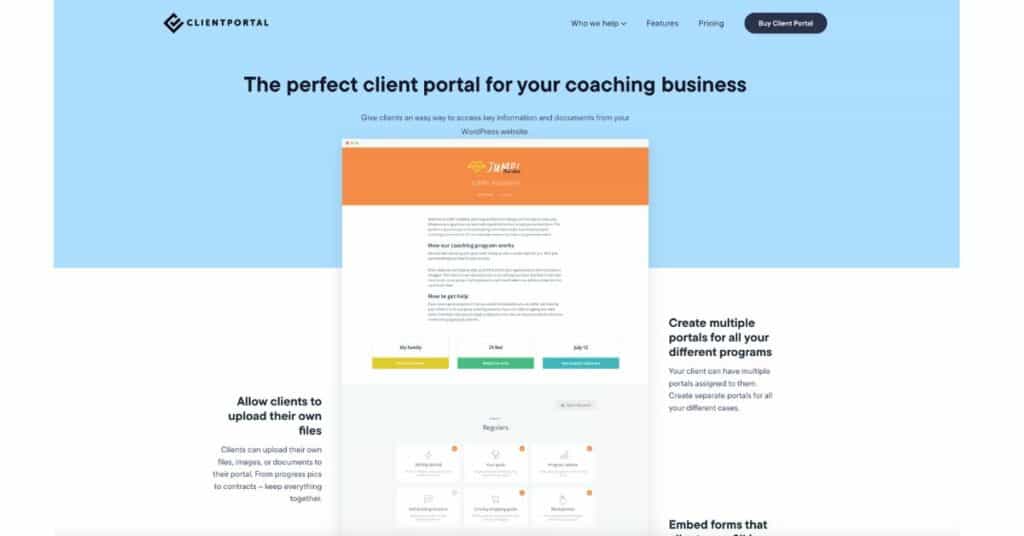
If someone wants to start as a freelancer in 2023, what advice would you give them?
Laura: When it comes to starting freelancing, my biggest advice would be to prioritize attending as many in-person events as possible. I firmly believe that starting is the hardest part of freelancing, especially when it comes to landing that first client. By conquering that initial hurdle, you’ve already overcome the most challenging aspect.
Looking back at my own experiences, I’ve realized that many positive shifts and opportunities in my freelancing career stemmed from meeting people in person. As someone who tends to be shy and introverted, stepping outside my comfort zone was not easy. However, attending local networking events, meetups, and conferences proved to be invaluable.
Interacting with fellow freelancers is beneficial as you can learn a lot from them. But it’s also important to seek out events where potential clients may be present. By engaging in conversations, offering assistance, and showcasing your expertise, you can organically attract clients and secure work opportunities. Building trust through face-to-face interactions goes a long way in establishing a strong foundation for future collaborations.
“Building trust through face-to-face interactions goes a long way in establishing a strong foundation for future collaborations.”
Laura Elizabeth
Could you share the best advice you’ve received throughout your freelancing journey?
Laura: Certainly. The best advice I’ve received aligns with an old philosophy attributed to Socrates: “Only focus on the things you can control and don’t worry about the things that you can’t control.” This principle has stuck with me and influenced my approach to freelancing.
For instance, we cannot control whether someone we meet at a networking event will want to work with us or whether an audience will enjoy our presentation. However, we do have control over our actions and attitudes within these situations. We can choose to attend the event, be friendly and professional, and provide value to others.
This mindset has been particularly helpful for me when dealing with nerves before giving a talk. Instead of worrying about how the audience will perceive my presentation, I focus on giving it my all, making it as interesting and engaging as possible.
This way, I feel accomplished, regardless of the audience’s response. This advice has proven valuable in various areas of life, reminding me to prioritize what I can control and let go of unnecessary worries.
How do you manage your time effectively, considering your multiple responsibilities such as building a product, attending conferences, speaking engagements, and hosting podcasts?
Laura: Time management has indeed become more challenging since I became a mother. With a two-year-old running around, my available hours have significantly reduced. To address this, I’ve had to refine my time management strategies. One method that has worked well for me is scheduling my days with a clear focus.
In the past, when I was freelancing and building ClientPortal, I allocated Fridays specifically for working on the product. I made it known to my clients that Fridays were dedicated to ClientPortal and that I would not be available for meetings or client work. This helped ensure that I made progress on ClientPortal consistently each week.
However, I soon realized that having just one day to build a product was not a lot of time. So, I had to prioritize ruthlessly and make the most of that day. Each Friday, I aimed to achieve measurable progress to keep the momentum going. This approach allowed me to maintain a steady pace of development and avoid getting stuck in a slow and unproductive cycle.
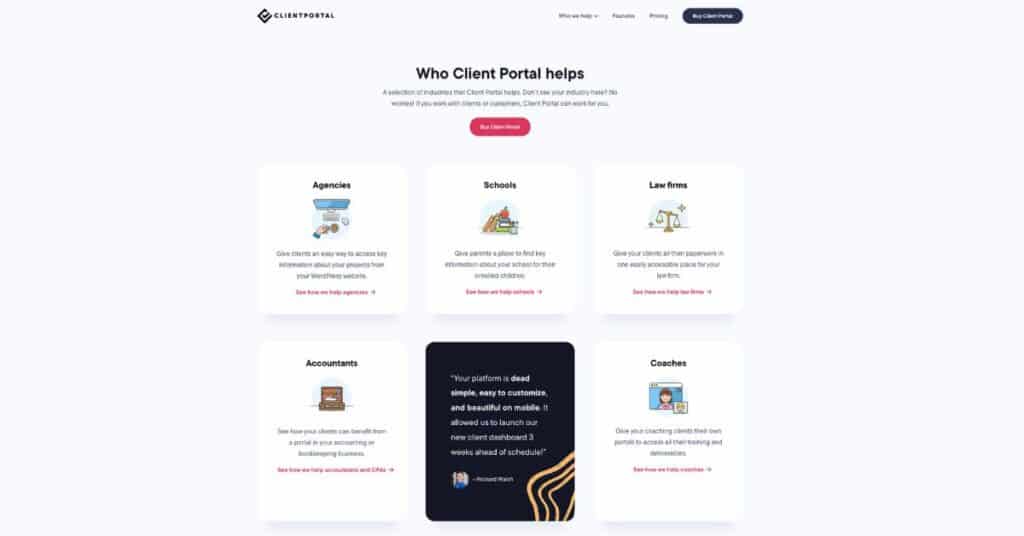
What has helped you overcome distractions and stay focused on your product work?
Laura: Absolutely. Time blocking has been instrumental in helping me stay on track and avoid getting pulled in different directions. Having specific time slots dedicated to my product work allows me to set clear boundaries and prioritize my tasks effectively. For instance, dedicating a full day or specific hours each day to focus solely on my product work ensures that I make consistent progress.
It’s important to recognize that there will always be demands and requests that can tempt you to deviate from your planned tasks. Whether it’s a last-minute call or a sudden client request, you have to be in charge of guarding your own time. By ruthlessly prioritizing and sticking to your time blocks, you create a structure that protects your productivity and progress.
Additionally, as my responsibilities increased and my available work hours decreased, I realized the need for assistance. Hiring an assistant to handle tasks like scheduling podcasts and managing administrative duties has been a game-changer for me. Even if it’s just a few hours a day, having someone support you in those essential but time-consuming tasks can alleviate a significant burden and allow you to focus on your core work.
Given your limited work hours, could you share how you structure your day and manage your projects effectively? How does your daily routine look like?
Laura: Certainly. My daily routine has evolved to accommodate my current circumstances. I wake up at around 6 a.m. and spend around 30 minutes practicing the piano. After that, I get my two-year-old ready for the day, have breakfast together, and then walk her to nursery, which takes about 20 minutes each way. Once I’m back, I start my work for the day.
To ensure progress and maintain focus, I work in six-week sprints. Each sprint is dedicated to a specific project or goal. For example, my current sprint focuses on email automation. During the six weeks, I plan and strategize for one week, implement the changes for four weeks, and then dedicate the final week for review and any unfinished tasks. Following the six-week sprint, I take a one-week sabbatical to rest and recharge before starting the next sprint.
This structure allows me to maintain momentum and accomplish significant milestones within a set timeframe. Now, my days are more structured, and I can plan my weeks around completing specific sprints. I find that breaking down projects into manageable chunks and allocating dedicated periods of intense focus helps me make consistent progress and avoid burnout.
Are there any specific habits or routines that you believe have played a significant role in your success?
Laura: Establishing a routine has been immensely helpful for me. I wake up at the same time every day, even on weekends, providing structure and focus when I’m in work mode. My routine has become so ingrained that deviation doesn’t even cross my mind.
Working from home doesn’t tempt me with distractions. I genuinely enjoy what I do, and it feels like an engaging video game where I not only level up, but make money, and achieve tangible results. This intrinsic motivation keeps me excited and focused.
While routine is beneficial, finding a balance is crucial. I allow myself the freedom to adapt and take breaks when necessary. If I feel burnt out or unwell, I listen to my body and take time off. Ultimately, it’s about finding a rhythm that aligns with your goals and values.
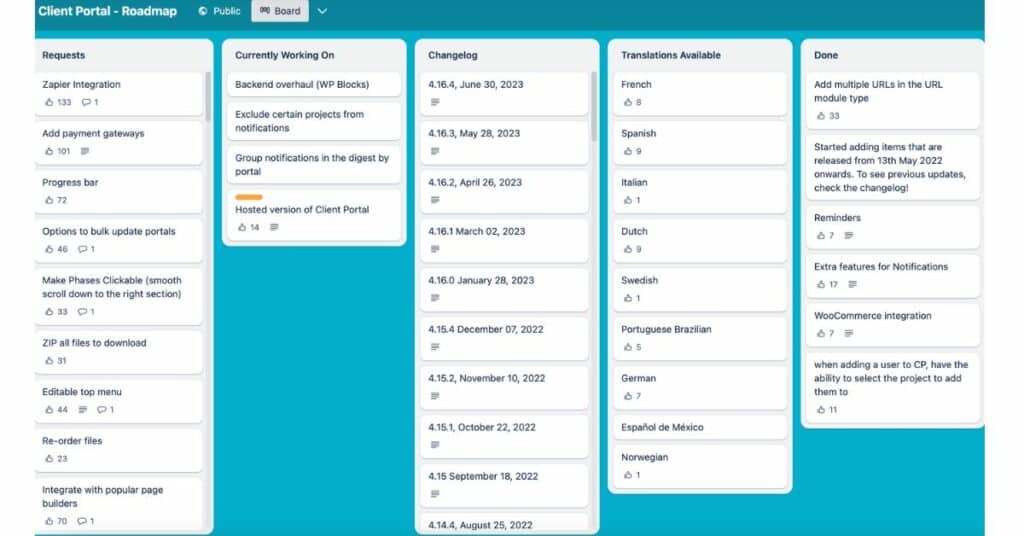
How are you currently generating revenue? Are there specific strategies or products that contribute to your income?
Laura: Most of my revenue comes from ClientPortal, the flagship product of my business. People purchase the software, and there’s also an optional yearly renewal subscription. While there is some recurring income, it’s an annual renewal rather than monthly.
However, I do receive a significant amount of traffic from Google, which helps with attracting new customers. Additionally, I have a design course for developers and a project pack that consists of documents and templates for freelancers. Although these products receive less focus from me, they still generate some passive income for my business.
How ClientPortal remains the primary source of revenue for your business. Do you recall your biggest month in terms of profit?
Laura: Pinpointing the exact details is a bit challenging since my husband and I run different businesses, but we share the same Stripe account, which can blur the numbers a bit. However, I distinctly remember a particularly successful Black Friday several years ago. I believe we made well over six figures in just the first day.
It was an exciting and somewhat crazy experience, especially considering the combined sales from ClientPortal and my other products. However, I must admit that recent Black Fridays haven’t been as lucrative as that memorable one. It seems like the dynamics have shifted, and many other entrepreneurs I’ve spoken to share the same sentiment.
How was the past year in terms of profit? Have you experienced continuous growth, or have there been any challenges?
Laura: Last year was a bit of a plateau for me in terms of growth. During the COVID-19 pandemic, I saw significant growth as more people transitioned to freelancing and invested in tools like ClientPortal. Many individuals had additional income due to government support measures in the UK. However, this year has been different.
I haven’t seen the same growth as before, and I suspect it’s due to the rising cost of living and a general belt-tightening trend. I’ve noticed similar patterns when speaking with other founders. Although it’s a challenging phase, I’m not overly concerned at the moment. I plan to focus on strategies like ads and SEO.
Laura, you mentioned earlier that you find your current income sufficient for your lifestyle and feel content with it. How much money is enough for you?
Laura: Absolutely. At this point, what I make is truly enough to sustain the lifestyle I desire, and I’m genuinely happy with it. I don’t aspire to build a massive corporation because I don’t want to sacrifice the things I love about my current setup.
Being constantly tied up in phone calls or meetings as a CEO is not something I desire. Sustainability is crucial to me. I want ClientPortal to endure and continue to bring joy to my work. My primary focus for ClientPortal’s future is to enhance the product and explore its full potential. I want to see how far I can take it while ensuring its sustainability.
I also aim to build a slightly larger team, potentially having a full-time developer on board to support further development. However, I don’t see myself striving to turn it into a massive enterprise. I want ClientPortal to last for a long time and maintain its appeal as a lifestyle business. I cherish the freedom and enjoyment it brings, so my goal is to grow it incrementally while preserving its essence.
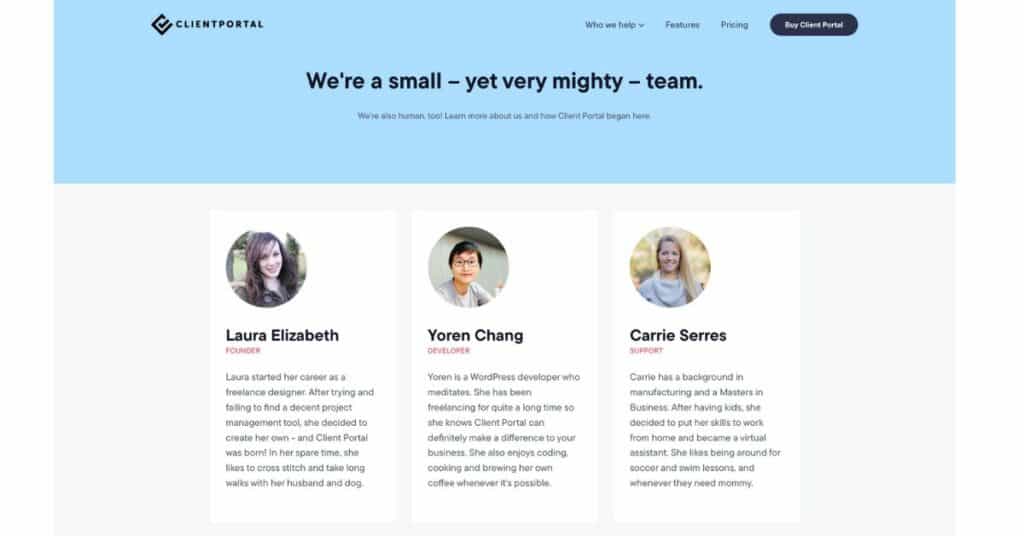
Do you have any suggestions or ideas for those venturing into product business?
Laura: When it comes to starting a product business, one crucial aspect is building an audience. Even before having a product to sell, focus on audience building. For me, it involved speaking at conferences, appearing on podcasts, and engaging with the freelancing community.
Although I hadn’t identified ClientPortal as my endgame during that phase, I’m grateful for being proactive in putting myself out there and connecting with people. Building an audience establishes trust, helps you understand their needs, and eventually leads to a solid foundation for your product.
“Even before having a product to sell, focus on audience building.”
Laura Elizabeth
What drives you to continue on this entrepreneurial path?
Laura: The primary motivation behind my entrepreneurial journey is the lifestyle it affords me. From a young age, I always had reservations about working a corporate nine-to-five job or being employed by someone else.
I value the freedom to enjoy life, pursue my passions, and avoid being constrained by limited vacation time or rigid schedules. Having the ability to travel, design my own days, and shape my weeks is incredibly motivating. Embracing entrepreneurship allows me to live life on my terms, and that’s the ultimate driving force for me.
Can you share your thoughts on what your life philosophy is?
Laura: To be honest, I haven’t really thought about it extensively, which might seem surprising. But if I had to sum it up, I believe in enjoying life and living freely. It’s important to embrace the present moment and not constantly think about some future happiness, like retirement or achieving certain goals.
We never know what tomorrow holds, so finding joy in the here and now is essential. Additionally, I think it’s crucial to create a life that aligns with your own desires rather than conforming to others’ expectations. Building a life that you genuinely want is a significant aspect of my philosophy.
Can you provide a brief overview about your speech at WC Europe for those who won’t be able to attend in person?
Laura: Certainly! In my speech, I’ll be discussing how onboarding freelancing processes can effectively address several challenges faced by freelancers. I’ll delve into topics like micromanagement and scope creep and explain how a well-executed onboarding experience can help mitigate these issues.
I’ll be presenting a framework for a great onboarding experience, emphasizing its usefulness, reusability, profitability, and the importance of delight. I’ll also walk through an onboarding process, guiding freelancers from initial contact with a client to the project’s commencement.
Since you have attended various conferences, what sets WordCamp apart from others in your experience?
Laura: Interestingly, this is my first WordCamp, although I’ve been involved in the WordPress space for quite some time. I realized that I needed to become more engaged in the WordPress community, and WordCamp was always on my radar. I never expected to speak at my first WordCamp, but it’s an incredible opportunity.
So far, I’ve been pleasantly surprised by the quality of the event, especially considering the modest ticket prices. It’s probably one of the most well-organized and polished events I’ve attended, and I’m thoroughly enjoying it. The community aspect is fantastic, as it facilitates genuine connections with like-minded individuals.
Conclusion
In conclusion, Laura Elizabeth’s life philosophy centers around embracing the present moment and living a life that is true to oneself. She believes in finding joy in the here and now, rather than constantly chasing future happiness.
Looking ahead to her speech at WordCamp Europe, Laura sheds light on the importance of effective freelancing onboarding. She highlights the role of a well-structured onboarding process in addressing common challenges faced by freelancer. She aims to guide freelancers through the entire onboarding journey, from the initial client contact to the start of a project.
Although attending her first WordCamp event, Laura expresses her positive impressions of WordCamp Europe. She also appreciates the strong sense of community fostered at WordCamps, providing opportunities for genuine connections with like-minded individuals.
We hope you enjoyed reading this interview. Let’s us know your opinions in the comments below.
